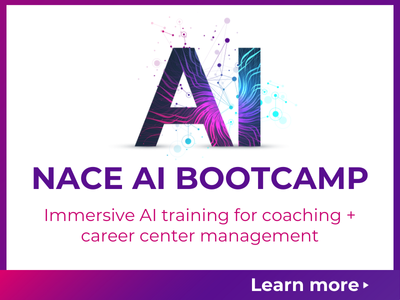Cayuga Community College’s (CCC) career services office launched its microcredentialing program in 2018. Since then, it has been building microcredentials in the non-credit and credit side of the institution, including developing its microcredential program in 2020 and updating it to an online learning platform in 2023.
Sheila Myers, professor and coordinator of applied learning, explains that the pandemic was the catalyst for developing credentials for students.
“We needed to think of ways to reach students who were moving to online learning,” Myers says.

Microcredentials to Help Launch Students’ Careers
Join Sheila Myers on Wednesday, May 8, 2024, and gain the knowledge and skills necessary to initiate and establish a career launch microcredential program.LEARN MORE
“Our office had numerous resources available, but we needed to consider how a student’s experience evolves over time in an academic setting. We transitioned all of our material to Brightspace in 2023.”
In addition, Myers said career services staff focused on updating video and reading material to include diversity in terms of gender, age, and people of color.
“As a community college, we are cognizant that many of our students are non-traditional, so the reading material reflects their unique situation,” she says.
For example, staff provide guidance for a mother who took time off from work and has gaps in her employment history about how to address this in a resume.
In addition, through the Perkins grant funding, CCC hired a career counselor to work with students in CTE programs who have identified accommodations. Staff developed resources specifically geared toward these students’ situations when they are preparing for the workforce.
“Another aspect of the readings is the attention to the use of resume templates that may not work with automated tracking systems,” Myers adds.
“We include readings about the impact if a student uses templates with columns, fancy fonts, and more, and we include resume templates that are simple and clean, without much ‘bling.’”
CCC’s microcredential program is titled “Career Launch” and includes credentials in the following order:
- Career Goals:
- Assess interests using O-*Net platform;
- Identify skills using NACE competencies as a metric; and
- Explore majors using “What Can I Do With This Major?”
- Career Professionalism:
- Develop a resume using provided templates;
- Set up a LinkedIn profile; and
- Set up a Handshake profile.
- Career Connections:
- Search for jobs using Indeed, Handshake, and LinkedIn;
- Craft a cover letter; and
- Conduct a mock interview (using the U.S. Department of Labor website for recording).
When CCC launched this program, it first piloted the program with 10 work-study students who might take advantage of the credentials as part of their training.
“We had success with several students completing at least one credential. Since then, we have transitioned our approach to train the trainer,” Myers points out.
“Now that it is transitioning to the train-the-trainer approach, we are looking to see how we can use it to recruit more students.”
In fall 2023, CCC career services hosted several workshops for internship coordinators, faculty, and adjuncts who teach business communications and technical writing, and those who serve as student advisers/coaches. They were also placed in the course shell as instructors.
“Now,” Myers says, “they are able to incorporate any of the material they choose in their own class or while advising students. Our hope is that through training the trainers, more students will gain access to these resources and be awarded the credentials.”
Students who have completed the credentials are prepared to search for jobs and network with alums and colleagues in their field of interest. They can post the credential digital badge to their LinkedIn profile and include it on a resume and in cover letters.
CCC career services has relied on word of mouth to market the Career Launch program. Myers and her staff are currently reviewing the microcredential webpage and intake process and are considering how best to market these to students and not confuse the general public that it is a for-credit option.
“In the future, we hope to continue with the train-the-trainer approach as well as formalize the process for students to take part in the Career Launch credentialing,” she says.
“This program is evolving. Our student services office is transitioning to a coaching model and as we move forward with this model, the word-of-mouth marketing will play a big part in advancing this initiative.”
For now, Myers advises that work on the microcredentialing program is ongoing.
“Just when you think you’ve covered everything, you find you need more,” she says.
For instance, spurred by industry requests, Myers and her team are now working on a module for soft skill development.
“Organizations are telling us that new employees are coming in without the proper communication skills, professional responsibility, and the ability to problem solve,” she explains.
Myers stresses element in the success of CCC’s microcredentialing program is that it accounts for the circumstances and meets the needs of its students.
“We have tailored the credentials to the realities of our student body,” Myers notes.
“Our students are not in a residential setting. Many of them have life experiences that preclude them from being on campus full time. Putting the material online and making it available for faculty to infuse with their own curriculum is one way to reach these hard-to-reach students.”






